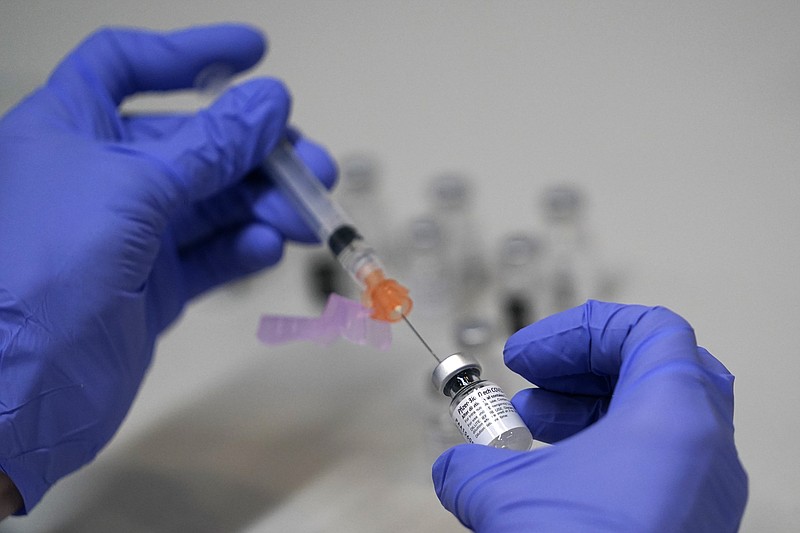Don't call them selfish.
The people who refuse to get the vaccine?
They're not selfish. It's not selfishness.
I've got a buddy, a 3 a.m. friend: if I call in the middle of the night, say, 3 a.m., and I'm in trouble, he'll come running, no questions asked.
He's hard-working. Grounded. Smart. All hat ... and cattle.
But he doesn't wear a mask. Never has. And he refuses to get the vaccine. His wife, his family - no vaccine.
I've got other friends - a few other 3 a.m. friends - who also refuse the vaccine.
They're some of the most selfless people I know.
Yes, there's a temptation to pressure and shame them. In the story we tell ourselves, my friend is the logjam, holding up our return to healthy, post-COVID-19 Hamilton County.
We have been through so much, and here is this vaccine - a modern miracle - and you're refusing it?
Which then compromises me and my family?
And all of us?
I can say this in anger.
But behind my anger?
Fear.
Yes, I'm vaccinated. Proudly. One shot - a Johnson & Johnson - in my left arm on a Thursday afternoon. I felt ticker-tape proud, a willing participant in this moment of scientific marvel, genius and innovation.
So much comes down to trust.
Who do I trust? What do I trust?
This spring, I've been reading "Apollo's Arrow" - Nicholas Christakis's account of COVID-19. It is clear, thorough and humbling. Oh, how little I know.
I can't write two sentences about how to create a vaccine. Don't know hemaglutinins from adjuvants, or the difference between the case fatality rates and infection fatality rates. Can you explain an RNA vaccine compared to a DNA vaccine?
Me neither.
It left me humbled.
Who am I to casually shout judgments about one of the most complex and intricate fields in the history of humanity? I realized that in a time of immense chaos, I had to cash my chips in with somebody; I chose the established collective wisdom of the majority of scientists, doctors and experts.
I chose established, verified news sources, nearly all of which existed before the Internet. (I have stopped watching all cable TV news. Wouldn't look twice at a Youtube video without fact-checking it, then again, and again.)
I chose the Hamilton County task force. Local doctors I trust.
"Get the vaccine," they all say.
Does this seem sheep-ish to you?
It does to my 3 a.m. friend.
He thinks I put my family in danger.
He's got his own trusted sources: videos, news sites and doctors, online and in person, who say the vaccine is a fool's game.
He prays for us. Tries to convince us.
How is that ... selfish?
Responsibility. Conscience. For the good of my family and community.
That's why I got the vaccine.
That's why he didn't.
Yes, I want him vaccinated. I believe his information is misguided and inaccurate. (He says the same about me.)
But what do I really want?
In this chaotic world, I want control. Security.
I want a way out of the fear.
I cling to the safety of the (false) belief that other people will behave the way I want them to behave. And believe as I believe.
And when they don't, I suffer.
"When I consider my own suffering, so much of it comes from the fact that I simply cannot accept life, and people as they are. I get upset by what people do," writes Buddhist teacher Thanissara in Tricycle. (Her husband is Kittisaro, the Chattanooga native.)
These are Tower of Babel times in America. We're living in an increasingly siloed sectarianism, pushed there by the constant devaluation of our institutions, often by online voices who say trust no one. Trust nothing.
Where does this lead?
Yes, there are other necessary conversations: why do Southerners refuse the vaccine at such high levels? How has the CDC been politicized over the years? Where does vaccine skeptisicm come from? (Nina Burleigh explains a lot in her New York Times essay "Why So Many Are Resisting Vaccination.")
But older, deeper questions remain: How can we make peace with people whose beliefs and behaviors differ, even dangerously so, from our own?
How can we rebuild trust in an age of distrust?
Above all, how do we deal with the great illness of life, which is not COVID-19, but the self - me, my, mine - and all its wants, desires and fears?
David Cook writes a Sunday column and can be reached at dcook@timesfreepress.com.
